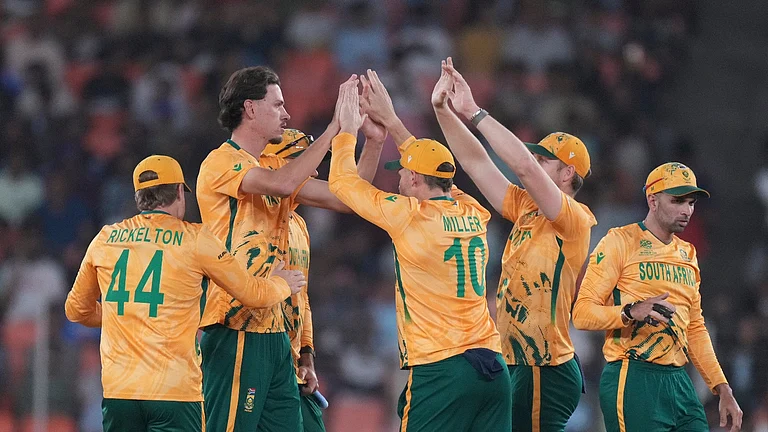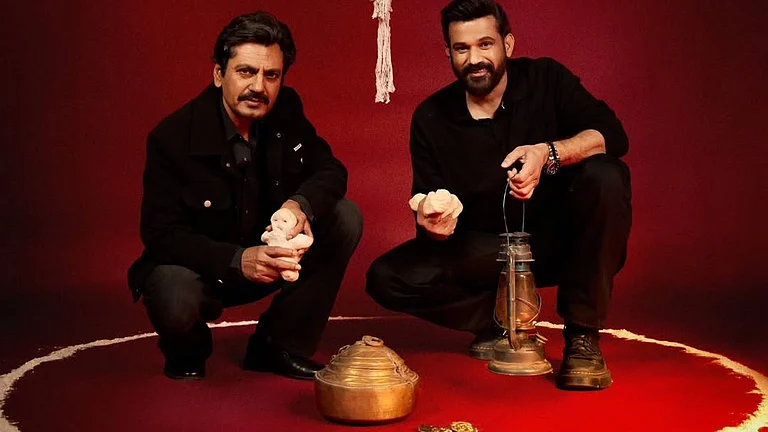Ladies and gentlemen, welcome to the NH 44, the 246-kilometre-long national highway that connects Jammu and Srinagar.
Let’s imagine millions of children, their parents and grandparents, couples and single adults, strangers and friends, and young students and elderly patients taking bus rides together every day round the year.
Each bus —all seats ‘occupied’ by fare-paying passengers— leaves Jammu bus stand for Srinagar. Passengers whose gods, faiths, and places of worship don’t matter to the man driving the vehicle on a ‘serpentine’ road through a ‘treacherous’ terrain. After around 85 minutes, the driver stops at Udhampur bus stand and hawkers and hustlers hop into the bus to sell their unwritten catalogue, which ranges from shawls to crescent orange candies to watches and batteries to popsicles and ice creams. We all know that these products are not the best in the market and that they might not even be hygienic in some cases, but the tired, hungry, and agitated children look at their parents with puppy eyes and convince them to buy one or more items from the verbal catalogue.
The national highway economy in J&K is an informal, unregulated hot-dog-beats-cold-dog marketplace with unwritten rules and tricks of the trade. The vendors sell what they think the trapped travellers might need, the captive passengers buy because in a moving bus their options are as limited as a gutka-selling Amitabh Bachchan’s sense of guilt.
There is more flying-low, under-the-radar kind of nuance to the high-road economy. The popular rajma chawal dhabas in Peerah, Ramban are a case in point. The passengers paying for their tickets and meals have no say in a lot of things that affect them financially, physically, and emotionally. The person behind the wheel chooses where to stop for lunch. He decides which dhaba gets a current of captive, confined customers who have the willingness and ability to pay for whatever they get served on their plates. Empty stomachs look for food as a matter of Pavlovian reflex. For the time being, God —singular or plural, male or female or transgender, and with or without statues— can wait in mosques, temples and churches. Copy to all other places of worship with due respect and daily rations for the trustee-boards.
Dear reader, the ride is over after six hours and fifteen minutes. The bus has now reached Pantha Chowk. Welcome to Srinagar, the city earlier known either as Shri Nagar — city of Shri, the Hindu goddess Lakshmi, meaning City of wealth, or as Sūrya Nagar, the city of Surya, the Sun god in Hinduism, meaning City of Sun. Let’s get out of our imaginary 56-seater bus and step into the flesh and blood political space of J&K where politicians cutting across ideological divides — mainstream, azadi-yearning, Pakistan-loving, and party-hopping— took three generations of innocent, gullible masses for a ride across the breadth and length of J&, and, yes, Ladakh.
The political space where no mufti —cleric— whether Shia or Sunni, trained in Deoband or in Rafiabad, financed by Rawalpindi or by Bathindi whimpers if a Mufti Mohammad Sayeed, a native of Bijbehara in Anantnag, contests Assembly elections from Ranbir Singh Pura in Jammu on a Congress ticket and wins in 1985. No, no native of Jammu will be allowed to contest from Bijbehara. Not halal, lover boy. The political space where every public figure from Syed Ali Shah Geelani to Yasin Malik to Gulzar Peer finds it kosher if a Ghulam Nabi Azad, a son of the soil from Bhalessa in Doda, contests Lok Sabha elections from Washim, Maharashtra on Congress ticket and wins in 1980 and 1985 or gets nominated to Rajya Sabha from Maharashtra in 1996. No, no local of Maharashtra will be allowed to contest from Doda even in sarpanch election. Not legit, my beloved.
The political space where a college-educated cabbage jumps from one bed to another political bed every wazwan-fuelled late night in order to become a minister of state even after the state has been turned into a union territory. The political space where an overrated MBA graduate, from a party with only three members in the Lok Sabha, shouts treachery from the Twitter rooftop if his opponents choose to form alliance with the Bharatiya Janata Party in J&K, but is happy being a junior minister in Delhi in a BJP-led political alliance. The political space where political leaders from Soura, Sopore, and Shopian overfed on a diet rich in hypocrisy, victimhood, and conspiracy theories send their children to colleges in Pune, Prague, and Princeton, but have gone out of their ways to ensure that millions of poor parents send their wards to the Jamaat-operated madrasa brand of schools where teaching geography to female students is prohibited because a daughter’s knowledge about the details of roads, places, and their topography would help her run away from their families and husbands.
The political space where the Union Home Secretary —an ultra-senior, power-drunk IAS officer— was asked by the Prime Minister to leave the national capital and station himself for a fortnight and assist the clueless administration headed by the Chief Secretary of J&K—another ultra-senior, equally power-fixated IAS officer— and supervise and monitor the rescue and relief operations meant to save the millions of families whose physical homes and emotional hereafters were devastated by massive floods in 2014; and there was complete breaking down of communication between these two bureaucrats because they were not on speaking terms with each other. Both of them belonged to the same batch in the IAS and were native of J&K. One from Jammu; the other from Kashmir. One was later forced to resign as he was alleged to have tried to stall the arrest of a scam-accused former union minister. One was earlier arrested for his ‘alleged’ involvement in a sex scandal in 2006 and was granted bail on ‘health’ grounds and was acquitted by the trial court and was doled out the chief secretary post by the chief minister of the day. Both of them were thick with every single chief minister —of NC, PDP, Congress— throughout their careers.
And nothing is a coincidence here. Stone-cold political and economic calculations bankroll the mode of operations of 42 families and their partners in crime and grime with due help from Article 370, a Nehruvian blunder that prevented evolution of the electoral space in J&K and that ensured that political players of all mutant varieties stick to their retentionist and rentier brand of political mobilisation. The gravy train run by government funds from New Delhi and hawala money from Pakistan and the Middle East turned J&K into a conservatory confined by geography, history, and religion-based identity politics. For three generations, political and intellectual and business elites —self-made and generational— with fine sartorial sense have dictated what should be sold to the masses here. The choice of policies to the choice of politics has been orchestrated by the privileged 42 families. They had successfully monopolised the political economy driven by guns, grenades, and an organised racket that peddles drugs and narratives to the voiceless masses in J&K. This might not exactly be a bad thing in some cases but is suicidal if left unchecked.
These 42 families always knew what should be sold to whom and how much and when and under what conditions, which ran their political and personal assembly line as smoothly and stealthily as possible. They had hijacked important nodal points of the assembly line with their stooges and foot-soldiers in bureaucracy, business, and media who were indebted by their favour-banks. Their loyalists and minions did their dirty work, killed, and got killed. They signed thousands of PSA warrants. It was a sweet arrangement, Sopore apple-sweet arrangement.
Abrogation of Article 370 in August 2019 upended the apple cart, derailed the gravy train, and cut off the supply line of the Nehruvian brand of dope that Article 370 was actually was.
On the other side of the equation, the buyers’ will and choices were never brought on the bargaining table. No options were given, no choices provided, no transparency encouraged, no accountability fixed. A premeditated handbook was distributed every few years by different ‘leaders’ and the captive masses bought what they were presented with, like the young hungry children on a moving bus. It would have been a fresh change if someone paused of a moment and spoke about accountability of any sort — of political and bureaucratic stakeholders. They have a symbiotic relationship, until they don’t. Which rarely happens. Been there, Done that.
They successfully played a real-life game of monopoly on a handcrafted rug of article 370. Their world turned upside down when the rug was pulled out. Literally and metaphorically.
Now that the rug has been pulled out and washed and is drying in the sun, the concerned parties are worried about it getting sunburnt or losing colour. But the monopoly has calmed down a bit and masses have options in the market. When the bus stops, people get down from the bus and check out the stalls and buy chips or fruits or nothing and feel empowered by the fact that they get to choose what to buy which could very well be the same thing the vendor want to shove down their throat but that is their choice to make.
The life-chances of the three generations of youth were held hostage by 42 families were stunted by the Nehruvian brand of drug that Article 370 was. And withdrawal syndrome is an objective reality based on the usual behavioural tics of whataboutery, self-fulfilling prophesy, victimhood, and optics management — with or without the business-as-usual intellectual gatekeeping by Cannes-Oscar-winning filmmakers, Pulitzer-scoring journalists and Booker-validated fiction writers.
Ladies and gentlemen, 69 years is a long enough timespan for the privileged 42 families and their goons in bureaucracy, business, and media to get criminally addicted to a drug so magnanimously bankrolled by Mr Nehru and his fly-by-night ‘liberal' heirs — 69, a really big number.
(Basant Rath is a 2000-batch IPS officer working in Jammu and Kashmir since December 2001. Views expressed are personal.)
























